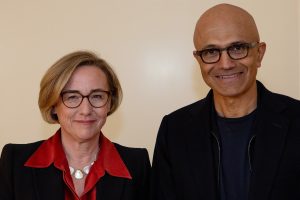Vodafone and Microsoft have announced a ten-year partnership with plans to bring digital services, AI, and cloud to “more than 300 million businesses” across Europe and Africa.
As part of the deal, Vodafone aims to improve its customer experience using Microsoft’s generative AI, scale its IoT connectivity platform, develop new digital and financial services for businesses (particularly SMEs, and those in Africa), and overhaul its global data centre cloud strategy.
The telco will be investing $1.5 billion over the next decade into cloud and customer-focused AI services, as developed alongside Microsoft.
The deal will also see Microsoft use Vodafone’s fixed and mobile connectivity services, and invest in the telco’s managed IoT connectivity platform — which will become a separate, standalone business by April 2024, with plans to open the platform to developers and third-parties using open APIs.
Vodafone’s financial technology platform in Africa, M-Pesa, by housing it on Microsoft’s cloud platform Azure. Plus, the firms are launching a program to enhance digital literacy in the continent, alongside upskilling and youth outreach programs, and offering digital services to the “underserved SME market.”
Last September, Vodafone partnered with Amazon to extend 4G and 5G connectivity across Europe and Africa, with the plan to provide connectivity to areas that may otherwise be challenging and costly to serve traditional fibre solutions.
TSF: Providing connectivity in a crisis situation
“This unique strategic partnership with Microsoft will accelerate the digital transformation of our business customers, particularly small and medium-sized companies, and step up the quality of customer experience for customers,” commented Vodafone Group chief executive, Margherita Della Valle.

Vodafone Group chief executive, Margherita Della Valle and Satya Nadella, chairman and CEO of Microsoft
“We are delighted that together with Vodafone we will apply the latest cloud and AI technology to enhance the customer experience of hundreds of millions of people and businesses across Africa and Europe,” added Satya Nadella, chairman and CEO of Microsoft.
As the industry reacts to the partnership, Luc Vidal, head of IoT business and mobility at enterprise communication firm BICS, believes that it will bring more attention to “connectivity twins.”
“Vodafone’s partnership with Microsoft shows the sustained growth we are seeing for IoT services,” Vidal comments. “[Connectivity twins] are the missing piece enterprises need to virtually clone IoT devices, including their connectivity components, for a single real-time view of their end-to-end IoT solutions, along with all device and application components.”
Essentially a digital twin for IoT, Vidal says that without these, enterprises will be deploying IoT devices “effectively blind and lacking real control over their systems.”
“As IoT devices continue to ramp up, these connectivity twins will be essential for enterprises to troubleshoot problems faster, better predict downtime and maintenance, facilitate end-to-end security, and improve overall service quality.”